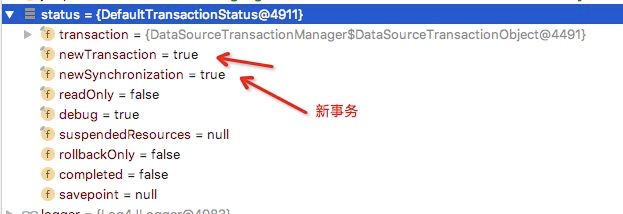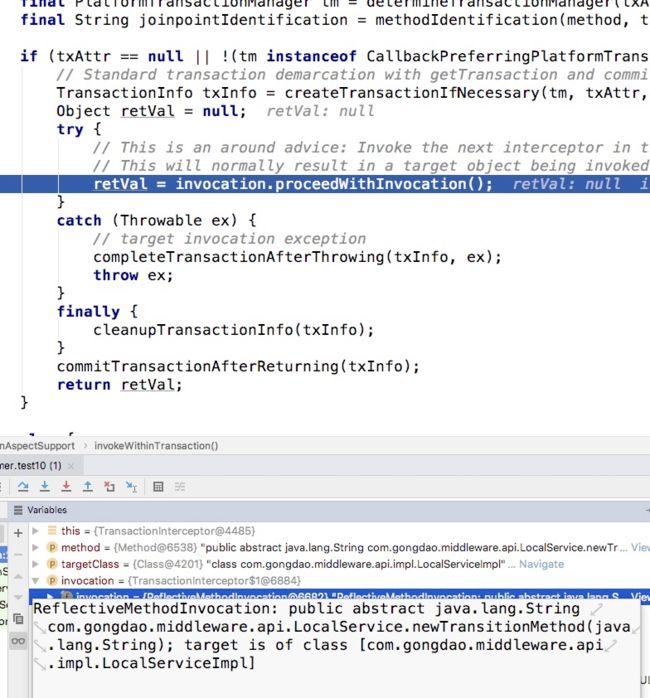org.springframework.transaction.support.AbstractPlatformTransactionManager#getTransaction
public final TransactionStatus getTransaction(TransactionDefinition definition) throws TransactionException {
Object transaction = doGetTransaction();
// Cache debug flag to avoid repeated checks.
boolean debugEnabled = logger.isDebugEnabled();
if (definition == null) {
// Use defaults if no transaction definition given.
definition = new DefaultTransactionDefinition();
}
if (isExistingTransaction(transaction)) {
// Existing transaction found -> check propagation behavior to find out how to behave.
return handleExistingTransaction(definition, transaction, debugEnabled);
}
// Check definition settings for new transaction.
if (definition.getTimeout() < TransactionDefinition.TIMEOUT_DEFAULT) {
throw new InvalidTimeoutException("Invalid transaction timeout", definition.getTimeout());
}
// No existing transaction found -> check propagation behavior to find out how to proceed.
if (definition.getPropagationBehavior() == TransactionDefinition.PROPAGATION_MANDATORY) {
throw new IllegalTransactionStateException(
"No existing transaction found for transaction marked with propagation 'mandatory'");
}
else if (definition.getPropagationBehavior() == TransactionDefinition.PROPAGATION_REQUIRED ||
definition.getPropagationBehavior() == TransactionDefinition.PROPAGATION_REQUIRES_NEW ||
definition.getPropagationBehavior() == TransactionDefinition.PROPAGATION_NESTED) {
SuspendedResourcesHolder suspendedResources = suspend(null);
if (debugEnabled) {
logger.debug("Creating new transaction with name [" + definition.getName() + "]: " + definition);
}
try {
boolean newSynchronization = (getTransactionSynchronization() != SYNCHRONIZATION_NEVER);
DefaultTransactionStatus status = newTransactionStatus(
definition, transaction, true, newSynchronization, debugEnabled, suspendedResources);
doBegin(transaction, definition);
prepareSynchronization(status, definition);
return status;
}
catch (RuntimeException ex) {
resume(null, suspendedResources);
throw ex;
}
catch (Error err) {
resume(null, suspendedResources);
throw err;
}
}
else {
// Create "empty" transaction: no actual transaction, but potentially synchronization.
if (definition.getIsolationLevel() != TransactionDefinition.ISOLATION_DEFAULT && logger.isWarnEnabled()) {
logger.warn("Custom isolation level specified but no actual transaction initiated; " +
"isolation level will effectively be ignored: " + definition);
}
boolean newSynchronization = (getTransactionSynchronization() == SYNCHRONIZATION_ALWAYS);
return prepareTransactionStatus(definition, null, true, newSynchronization, debugEnabled, null);
}
}
属性处理
protected TransactionInfo prepareTransactionInfo(PlatformTransactionManager tm,
TransactionAttribute txAttr, String joinpointIdentification, TransactionStatus status) {
TransactionInfo txInfo = new TransactionInfo(tm, txAttr, joinpointIdentification);
if (txAttr != null) {
// We need a transaction for this method...
if (logger.isTraceEnabled()) {
logger.trace("Getting transaction for [" + txInfo.getJoinpointIdentification() + "]");
}
// The transaction manager will flag an error if an incompatible tx already exists.
txInfo.newTransactionStatus(status);
}
else {
// The TransactionInfo.hasTransaction() method will return false. We created it only
// to preserve the integrity of the ThreadLocal stack maintained in this class.
if (logger.isTraceEnabled())
logger.trace("Don't need to create transaction for [" + joinpointIdentification +
"]: This method isn't transactional.");
}
// We always bind the TransactionInfo to the thread, even if we didn't create
// a new transaction here. This guarantees that the TransactionInfo stack
// will be managed correctly even if no transaction was created by this aspect.
txInfo.bindToThread();
return txInfo;
}
protected final class TransactionInfo {
private final PlatformTransactionManager transactionManager;
private final TransactionAttribute transactionAttribute;
private final String joinpointIdentification;
private TransactionStatus transactionStatus;
private TransactionInfo oldTransactionInfo;
}
org.springframework.transaction.interceptor.TransactionAspectSupport#invokeWithinTransaction
protected Object invokeWithinTransaction(Method method, Class targetClass, final InvocationCallback invocation)
throws Throwable {
// If the transaction attribute is null, the method is non-transactional.
final TransactionAttribute txAttr = getTransactionAttributeSource().getTransactionAttribute(method, targetClass);
final PlatformTransactionManager tm = determineTransactionManager(txAttr);
final String joinpointIdentification = methodIdentification(method, targetClass, txAttr);
if (txAttr == null || !(tm instanceof CallbackPreferringPlatformTransactionManager)) {
// Standard transaction demarcation with getTransaction and commit/rollback calls.
TransactionInfo txInfo = createTransactionIfNecessary(tm, txAttr, joinpointIdentification);
Object retVal = null;
try {
// This is an around advice: Invoke the next interceptor in the chain.
// This will normally result in a target object being invoked.
retVal = invocation.proceedWithInvocation();
}
catch (Throwable ex) {
// target invocation exception
completeTransactionAfterThrowing(txInfo, ex);
throw ex;
}
finally {
cleanupTransactionInfo(txInfo);
}
commitTransactionAfterReturning(txInfo);
return retVal;
}
else {
final ThrowableHolder throwableHolder = new ThrowableHolder();
// It's a CallbackPreferringPlatformTransactionManager: pass a TransactionCallback in.
try {
Object result = ((CallbackPreferringPlatformTransactionManager) tm).execute(txAttr,
new TransactionCallback @Override
public Object invoke(final MethodInvocation invocation) throws Throwable {
// Work out the target class: may be {@code null}.
// The TransactionAttributeSource should be passed the target class
// as well as the method, which may be from an interface.
Class targetClass = (invocation.getThis() != null ? AopUtils.getTargetClass(invocation.getThis()) : null);
// Adapt to TransactionAspectSupport's invokeWithinTransaction...
return invokeWithinTransaction(invocation.getMethod(), targetClass, new InvocationCallback() {
@Override
public Object proceedWithInvocation() throws Throwable {
return invocation.proceed();
}
});
}
这是切面AOP的包
org.springframework.aop.framework.ReflectiveMethodInvocation#proceed
@Override
public Object proceed() throws Throwable {
// We start with an index of -1 and increment early.
if (this.currentInterceptorIndex == this.interceptorsAndDynamicMethodMatchers.size() - 1) {
return invokeJoinpoint();
}
Object interceptorOrInterceptionAdvice =
this.interceptorsAndDynamicMethodMatchers.get(++this.currentInterceptorIndex);
if (interceptorOrInterceptionAdvice instanceof InterceptorAndDynamicMethodMatcher) {
// Evaluate dynamic method matcher here: static part will already have
// been evaluated and found to match.
InterceptorAndDynamicMethodMatcher dm =
(InterceptorAndDynamicMethodMatcher) interceptorOrInterceptionAdvice;
if (dm.methodMatcher.matches(this.method, this.targetClass, this.arguments)) {
return dm.interceptor.invoke(this);
}
else {
// Dynamic matching failed.
// Skip this interceptor and invoke the next in the chain.
return proceed();
}
}
else {
// It's an interceptor, so we just invoke it: The pointcut will have
// been evaluated statically before this object was constructed.
return ((MethodInterceptor) interceptorOrInterceptionAdvice).invoke(this);
}
}
上面的反射包会走到下面的类,
/**
* Implementation of AOP Alliance MethodInvocation used by this AOP proxy.
*/
private static class CglibMethodInvocation extends ReflectiveMethodInvocation {
private final MethodProxy methodProxy;
private final boolean publicMethod;
public CglibMethodInvocation(Object proxy, Object target, Method method, Object[] arguments,
Class targetClass, List反射invoke后会走到真正的方法
org.springframework.cglib.proxy.MethodProxy#invoke
@Override
public Object invoke(Object proxy, Method method, Object[] args) throws Throwable {
MethodInvocation invocation;
Object oldProxy = null;
boolean setProxyContext = false;
TargetSource targetSource = this.advised.targetSource;
Class targetClass = null;
Object target = null;
try {
if (!this.equalsDefined && AopUtils.isEqualsMethod(method)) {
// The target does not implement the equals(Object) method itself.
return equals(args[0]);
}
else if (!this.hashCodeDefined && AopUtils.isHashCodeMethod(method)) {
// The target does not implement the hashCode() method itself.
return hashCode();
}
else if (method.getDeclaringClass() == DecoratingProxy.class) {
// There is only getDecoratedClass() declared -> dispatch to proxy config.
return AopProxyUtils.ultimateTargetClass(this.advised);
}
else if (!this.advised.opaque && method.getDeclaringClass().isInterface() &&
method.getDeclaringClass().isAssignableFrom(Advised.class)) {
// Service invocations on ProxyConfig with the proxy config...
return AopUtils.invokeJoinpointUsingReflection(this.advised, method, args);
}
Object retVal;
if (this.advised.exposeProxy) {
// Make invocation available if necessary.
oldProxy = AopContext.setCurrentProxy(proxy);
setProxyContext = true;
}
// May be null. Get as late as possible to minimize the time we "own" the target,
// in case it comes from a pool.
target = targetSource.getTarget();
if (target != null) {
targetClass = target.getClass();
}
// Get the interception chain for this method.
Listorg.springframework.aop.framework.JdkDynamicAopProxy#invoke
public Object invoke(Object proxy, Method method, Object[] args) throws Throwable {
MethodInvocation invocation;
Object oldProxy = null;
boolean setProxyContext = false;
TargetSource targetSource = this.advised.targetSource;
Class targetClass = null;
Object target = null;
try {
if (!this.equalsDefined && AopUtils.isEqualsMethod(method)) {
// The target does not implement the equals(Object) method itself.
return equals(args[0]);
}
else if (!this.hashCodeDefined && AopUtils.isHashCodeMethod(method)) {
// The target does not implement the hashCode() method itself.
return hashCode();
}
else if (method.getDeclaringClass() == DecoratingProxy.class) {
// There is only getDecoratedClass() declared -> dispatch to proxy config.
return AopProxyUtils.ultimateTargetClass(this.advised);
}
else if (!this.advised.opaque && method.getDeclaringClass().isInterface() &&
method.getDeclaringClass().isAssignableFrom(Advised.class)) {
// Service invocations on ProxyConfig with the proxy config...
return AopUtils.invokeJoinpointUsingReflection(this.advised, method, args);
}
Object retVal;
if (this.advised.exposeProxy) {
// Make invocation available if necessary.
oldProxy = AopContext.setCurrentProxy(proxy);
setProxyContext = true;
}
// May be null. Get as late as possible to minimize the time we "own" the target,
// in case it comes from a pool.
target = targetSource.getTarget();
if (target != null) {
targetClass = target.getClass();
}
// Get the interception chain for this method.
List获取目标类
TargetSource targetSource = this.advised.targetSource;
List
会走到
org.springframework.transaction.interceptor.TransactionInterceptor#invoke
public Object invoke(final MethodInvocation invocation) throws Throwable {
// Work out the target class: may be {@code null}.
// The TransactionAttributeSource should be passed the target class
// as well as the method, which may be from an interface.
Class targetClass = (invocation.getThis() != null ? AopUtils.getTargetClass(invocation.getThis()) : null);
// Adapt to TransactionAspectSupport's invokeWithinTransaction...
return invokeWithinTransaction(invocation.getMethod(), targetClass, new InvocationCallback() {
@Override
public Object proceedWithInvocation() throws Throwable {
return invocation.proceed();
}
});
}
很明显,有进行事务处理的逻辑
TransactionInfo txInfo = createTransactionIfNecessary(tm, txAttr, joinpointIdentification);
调用路线:
org.springframework.aop.framework.CglibAopProxy.DynamicAdvisedInterceptor#intercept
org.springframework.aop.framework.CglibAopProxy.CglibMethodInvocation
org.springframework.aop.framework.CglibAopProxy#processReturnType
org.springframework.aop.framework.JdkDynamicAopProxy#invoke
chain
org.springframework.aop.framework.ReflectiveMethodInvocation#proceed
org.springframework.transaction.interceptor.TransactionInterceptor#invoke
org.springframework.transaction.interceptor.TransactionAspectSupport#invokeWithinTransaction
- org.springframework.transaction.interceptor.TransactionAspectSupport#createTransactionIfNecessary
- org.springframework.transaction.support.AbstractPlatformTransactionManager#getTransaction
- org.springframework.transaction.support.AbstractPlatformTransactionManager#handleExistingTransaction
- org.springframework.transaction.interceptor.TransactionAspectSupport#prepareTransactionInfo
回调
org.springframework.aop.framework.ReflectiveMethodInvocation#proceed
org.springframework.aop.framework.ReflectiveMethodInvocation#invokeJoinpoint
org.springframework.aop.support.AopUtils#invokeJoinpointUsingReflection
java.lang.reflect.Method#invoke
com.gongdao.middleware.api.impl.LocalServiceImpl#newTransitionMethod
org.springframework.transaction.interceptor.TransactionAspectSupport#cleanupTransactionInfo
org.springframework.transaction.interceptor.TransactionAspectSupport#cleanupTransactionInfo
org.springframework.transaction.interceptor.TransactionAspectSupport.TransactionInfo#restoreThreadLocalStatus
org.springframework.transaction.interceptor.TransactionAspectSupport#commitTransactionAfterReturning
org.springframework.transaction.support.AbstractPlatformTransactionManager#commit
org.springframework.transaction.support.AbstractPlatformTransactionManager#processCommit
com.gongdao.middleware.db.GongDaoDataSourceTransactionManager#doCommit
org.springframework.transaction.support.AbstractPlatformTransactionManager#triggerAfterCommit
org.springframework.transaction.support.AbstractPlatformTransactionManager#triggerAfterCompletion
......
org.springframework.transaction.support.AbstractPlatformTransactionManager#cleanupAfterCompletion
com.gongdao.middleware.db.GongDaoDataSourceTransactionManager#doCleanupAfterCompletion




